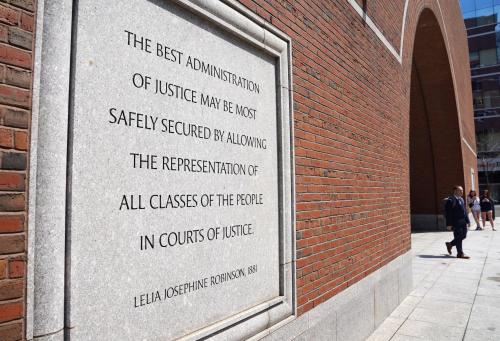Hillary Clinton is highlighting the issue of student debt in the wrong way. Her campaign recently published an analysis[1] illustrating how much borrowers would be able to save for retirement if they weren’t paying back student loans, without properly considering the economic benefits of college.
Debt versus retirement savings?
The campaign’s case study was a college graduate with $28,950 in student debt (the average burden held by 2014 graduates) paying back their obligation over 20 years. Let’s call him Bernie. At federally subsidized interest rates, Bernie will be making monthly payments of $186. What if, the campaign asks, rather than making these debt payments, he was putting the same amount towards retirement? The answer: if Bernie puts the same amount into a 401k every month, he will have accrued $86,000 in retirement savings within 20 years.
Mathematically speaking, these numbers are correct. But it amounts to a one-sided cost benefit analysis, which assumes we can wipe away a borrower’s monthly payments without other financial consequences. If that were an option, I’d be all for it. But it’s not. There is no free lunch.
Three ways to abolish student debt
How could we free Bernie from his $186 monthly payments? Only really in one of three ways:
- Federal government forgiveness of outstanding debt burdens. But this would mean raising taxes or cutting other social benefits, perhaps impacting the same people receiving relief from the loan forgiveness.
- Lower the cost of college. Sounds good, but it is far from obvious how to do this without increasing taxes or reducing quality.
- Bernie doesn’t go to college. Of course, Bernie might decide not to go to college at all. In fact, the heated and often inaccurate rhetoric about student debt might well persuade him not to.
No debt, but no college, means a lot less money
Let’s look at a true cost benefit analysis of that last option. If Bernie skips college altogether, he’ll earn about $1,800 per month less. So even taking account of debt payments, he still comes about $1,650 per month behind where he would have been if he’d gone to college and taken on debt. Over the course of twenty years, this means he’d lose around $396,000.
|
Education attained |
Unemployment rate in 2015 (percent) |
Median weekly earnings in 2015 |
|
Doctoral degree |
1.7 |
$1,623 |
|
Professional degree |
1.5 |
$1,730 |
|
Master’s degree |
2.4 |
$1,341 |
|
Bachelor’s degree |
2.8 |
$1,137 |
|
Associate’s degree |
3.8 |
$798 |
|
Some college, no degree |
5 |
$738 |
|
High school diploma |
5.4 |
$678 |
|
Less than a high school diploma |
8 |
$493 |
|
All workers |
4.3 |
$860 |
|
Note: Data are for persons age 25 and over. Earnings are for full-time wage and salary workers. |
||
|
Source: Current Population Survey, U.S. Department of Labor, U.S. Bureau of Labor Statistics |
||
Time for honest talk on college debt
Perhaps the other routes to zero debt—loan forgiveness or measures to make college cheaper—will prove more attractive, depending on the circumstances. But the key point is that less debt isn’t always better. Whether from an individual or a policy perspective, reducing student debt isn’t costless.
Reduction of student debt is a laudable goal, but the benefits need to be properly weighed against the costs. It’s also important to think about the distributional impact of student debt relief. People who have student debt are, on average, more educated and have higher earnings and lower risks of unemployment. If we are to use public funds to shore up individual financial security and retirement savings, this is probably the group that needs them the least. There is an important and timely national dialogue underway on college affordability. As we weigh the various policy options, we need to be careful to be clear and honest about the tradeoffs inherent in each.
[1] Kat Kane, “How much could you save for retirement if you weren’t paying off student loans?,” last modified April 8, 2016, https://www.hillaryclinton.com/. (Editor’s note: this document is unavailable as of May 23, 2016.)
The Brookings Institution is committed to quality, independence, and impact.
We are supported by a diverse array of funders. In line with our values and policies, each Brookings publication represents the sole views of its author(s).




Commentary
A one-sided cost benefit analysis on student debt from the Clinton campaign
May 20, 2016